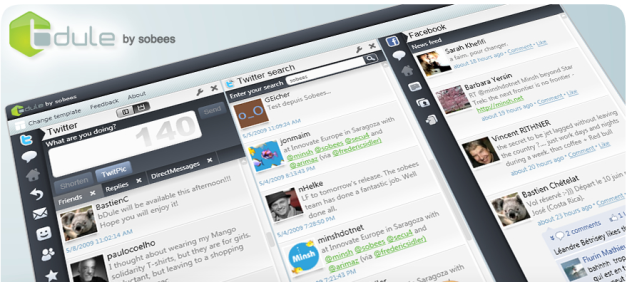The Latest from TechCrunch |  |
| Our Last Post About Twitter (Today — Maybe) Posted: 09 May 2009 06:30 PM PDT
Simply put, we write about Twitter so often because right now, it matters. From news organizations to movie stars, from earthquakes to fires, from Facebook to Google — everyone seems to be talking about, to or with Twitter. In an era of mass communication, it is the latest medium. And it’s fundamentally changing the ways in which people interact with others using the web. What you may view as a stupidly simple service with no real point, I view as one of the few inspirational products in bleak times. I would argue that Twitter works so well precisely because it’s so simple. It fools some people with its “What are you doing?” question that resides at the top of the page, but Twitter can pretty much be about whatever you want it to be about. That’s why it’s an absolutely brilliant platform for so many new startups to build on top of. And those startups are really the key. They’re what are keeping Twitter so hot right now. Every day, something new launches on top of Twitter; some get coverage, some don’t. Some are silly, some are smart, some might actually work. But overall, the level of activity around the platform is amazing. And that activity, fuels growth and feeds the system full of its most important life-blood: Information. It’s this real-time information that is Twitter’s most valuable asset. And it’s information that Twitter will soon begin mining in more interesting ways with its search product — which should be useful to a lot of people. And it should lead to even more innovation and more startups. Stop and think for a moment about any one startup that has had such an impact on other startups. There aren’t many, and there really hasn’t been one for a while. I suppose you could throw Facebook in there, and before that obviously Google. But really, there aren’t too many companies in general that are changing the ways others do things, the way Twitter is right now. And that’s why I think it’s worth writing about so often. It’s not just about Twitter, the product, it’s also about Twitter, the idea. And Twitter, the catalyst of change. Twitter has shaken shit up in the industry. And it’s exciting as hell when a company does that, because the subsequent chaos almost always breeds cool new things. And “cool new things” is what technology is and always has been about. And if you’ve been paying attention, Twitter is hardly the only thing in technology to have gotten a lot of hype and draw complaints for getting too much coverage in the past few years. We saw it with Google, we saw it with Facebook, we saw it with the iPhone and then we saw it again with the App Store. What do all of these things share in common? They all shook shit up. They were all great products, all became very popular, and all caused industry shifts. Twitter is just the latest of these. But it won’t be the last. When that something new comes along, we’ll be on it, covering it relentlessly too. Because these things matter, because we’re passionate about them and because the vast majority of readers do care. And at least we’re not gushing over the people behind the scenes at Twitter as they go out drinking at night, like The New York Times did today. Not yet, anyway. [photo: flickr/ndanger] Crunch Network: CrunchBoard because it’s time for you to find a new Job2.0 |
| Posted: 09 May 2009 04:19 PM PDT MySpace has let go of as many as 45 employees in the last week, we’ve confirmed. Sources close to the company say that the exact figure may be smaller, but that MySpace has definitely laid off a significant number of people. MySpace has refused to comment on the matter, so it isn’t clear if this was the result of a canceled project, general layoffs, or performance-based cuts. A source says that early signs indicate that the open positions will not be filled by other employees. The news comes only a few weeks after MySpace suddenly dropped founding CEO Chris DeWolfe and brought on a new executive team led by Owen Van Natta. It’s unclear if the cuts are directly related to decisions made by the new team or if they were already set in motion prior to DeWolfe’s departure. In any case, we’ll probably hear about more restructuring as Van Natta and team slash the projects they don’t want to continue pursuing. Last July MySpace was rumored to have laid off as much as 5% of its workforce, though the company later said that the cuts were performance based and amounted to “less than 5%” of the company. Crunch Network: CrunchBase the free database of technology companies, people, and investors |
| Rampant Piracy Will Be The Kindle DX’s Savior Posted: 09 May 2009 11:00 AM PDT
Earlier this week, we got our first glimpse of the Kindle DX, Amazon’s upcoming E-book reader that has taken the original Kindle’s nearly prohibitive $359 price tag and bumped it up to an even more exorbitant $489 for good measure. Granted, the DX has one major improvement: a bigger screen that makes it suitable for textbooks, professional journal articles, and even newspapers. I’ve spent the last few days mulling over the future prospects of the new device, and up until a few hours ago my forecast was looking pretty grim. But then a lightbulb went off over my head: pirates are going to save the Kindle DX. But before I get to that, let’s address why the Kindle DX is poised to fail. The Newspaper Strategy Three major newspapers have banded together for an experimental trial run on the Kindle DX, offering cheaper long-term subscriptions to customers in return for the fact that their distribution costs will be next to nothing. The newspaper angle might be attractive for a few people, but I’m not convinced that it’s actually going to sell many Kindle DX’s - at least, not without the newspapers subsidizing the device’s cost as part of a subscription plan. Over $500 after taxes, plus paying for the newspaper subscriptions themselves, for convenient access to content that is already available for free online? I just don’t see it happening.
But the Kindle’s real weakness is its highlighting and annotation functionality. In a real book, you can mark up your textbook and make notes to yourself in the margins. The Kindle lets you highlight and take notes, but the interface is painful to use with any kind of frequency - E-ink doesn’t lend itself well to quick navigation, nor does the Kindle’s joystick/button interface. From a student’s perspective, the Kindle is badly in need of a touchscreen. And while some students may initially grab the Kindle DX as soon as it comes out for the ‘cool’ factor, practicality (and cost) will rule it out for most of them. Unless.. Pirates To The Rescue
College textbooks are really expensive. As in, $300+ per quarter (a small fortune for someone with little to no income) for a set of books that you may only occasionally look at and will have no use for three months down the line. If you’re thrifty you can sell those books back to your school and get doubly screwed when they fork over a laughably small return. Selling them online through services like Chegg usually yields better results, but for whatever reason most students still don’t use them. So why don’t these students, renowned pirates as they are, simply copy the books? Well, textbook piracy already exists. If you know where to look online, you can find many novels and textbooks scanned in their entirety as PDFs. But until now, pirated textbooks were more trouble than they were worth. Reading them on a computer screen is a pain for obvious reasons. The alternative, printing out hundreds of pages at a time, results in an unwieldly mess that also stands out like a sore thumb whenever you pull it out in class. The Kindle DX changes that. Just find the book you want in PDF form, upload it to your Kindle over USB, and you’ve got a perfectly readable and convenient textbook. Sure, students will have to deal with the usability issues I raised above, like slow highlighting. But these books, frustrating as they might be, will be 100% free. That’s $300 per quarter in extra beer money. Most obstacles and morals fade quickly in the face of that much alcohol. Now, this is an issue we’ve brought up before when the original Kindle came out, and it hasn’t really been a problem. But most of the books people have been buying up until now are available for a mere $9.99 from Amazon. For most people, the motivation simply isn’t there to figure out how to pirate a book. But when you’re faced with a price tag of around $70 per textbook there’s a far greater incentive to find a workaround. It’s easier to find pirated files on campus too - students will be surrounded by classmates using the exact same textbooks so there’s a better chance someone will have a pirated digital version. And there’s always the resident friendly geek down the hall ready to help with any tech support issues. So the Kindle DX may wind up selling well to Amazon’s chagrin. Amazon is really in the business of selling ‘the blades’ - it cares more about selling books than it does about selling devices (this is why Amazon offers an E-book reader for the iPhone too). Then again, it might just work out for the company after all. Students may take the time to pirate expensive textbooks, shortchanging their publishers. But a New York Times Bestseller? Why, I’d save myself the trouble and just buy it for $9.99 off Amazon. Crunch Network: CrunchBoard because it’s time for you to find a new Job2.0 |
| Animoto Gives Procrastinators A Last-Minute Mother’s Day Gift Posted: 09 May 2009 09:30 AM PDT
Mother’s Day is just around the corner and those of you who are on top of your game have probably already sent a card and arranged to give your mom a thoughtful gift of flowers, candy, or a gift certificate to a spa. For those of you out there who have done none of the above, Animoto, a startup that automatically generates high quality slideshow/music videos from a set of photos, offers you the ability to make a heartfelt video greeting that would warm any mother’s heart. The site features a Mother’s Day card that allows you to submit a handful of photos to automatically create a sentimental video-slideshow set to your mom’s favorite music. It’s an easy, quick and and innovative way to show your Mom how much you love and value her on Mother’s Day. Animoto, which launched in 2007, also helped users make creative slideshow greetings cards on Valentine’s Day and and over the holiday season. Animoto offers a nifty service and does a nice job of spicing up photo albums, with little effort needed on the users' part. Competitors include RockYou and Slide. Crunch Network: CrunchBoard because it’s time for you to find a new Job2.0 |
| Sobees Latest Horse To Enter The Twitter / Facebook Desktop Client Race Posted: 09 May 2009 09:24 AM PDT
Another horse in this race that barely gets a mention is Sobees, probably in big part because of the fact it’s only available for Windows users (with the latest .NET framework, moreover), although it doesn’t really deserve to be below the radar this much at all. We covered the company’s social network aggregator when it entered public beta, and wrote that they were aiming to attract a mainstream audience for their software, which enables users to manage a fairly wide variety of web apps and social networking services from their desktops. It’s a nifty companion that plugs into Facebook, Twitter, Digg, Flickr, YouTube and many more web services, but I’ve always felt it was far too overloaded with features for me to use it on a daily basis. So I was interested when the company set out to build a stand-alone client for Twitter, Facebook and Twitter Search. And just as they were working on that, Facebook launched its Open Stream API so they made thankful use of it quite rapidly and converted the API to .NET and integrated the stream into the new client. The software is now in alpha and publicly available under the name bDule, and it’s definitely worth checking out even if you only use one of the two services it supports. Soon, we’ll do a feature-by-feature comparison for all the existing social desktop applications, but for now let me just say Sobees is very much worthy of being included whenever someone talks about Facebook / Twitter clients. As mostly all of the apps mentioned on top bDule is a bit of a memory drain, and at times renders a bit slow, but the UI is really well thought-out (love the different templates you can switch to in just one mouse-click) and it does what it’s supposed to do really well. Too bad it’s Windows / .NET only, because I’m sure there’s an audience out there that’s looking for just this type of app.
Crunch Network: CrunchGear drool over the sexiest new gadgets and hardware. |
| You are subscribed to email updates from TechCrunch To stop receiving these emails, you may unsubscribe now. | Email delivery powered by Google |
| Inbox too full? | |
| If you prefer to unsubscribe via postal mail, write to: TechCrunch, c/o Google, 20 W Kinzie, Chicago IL USA 60610 | |







 For a while now, we’ve been tracking a number of companies who are hard at work trying to build the ultimate social networking desktop app. We’ve talked about
For a while now, we’ve been tracking a number of companies who are hard at work trying to build the ultimate social networking desktop app. We’ve talked about 
No comments:
Post a Comment